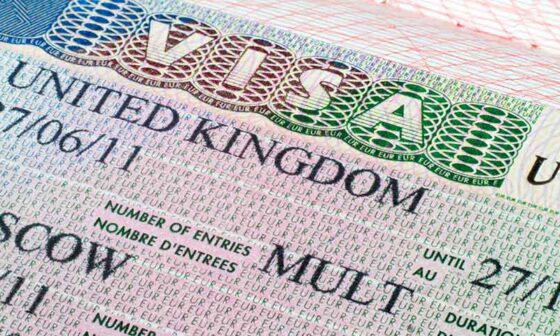Many professionals dream of moving to Germany for work, and visa-sponsored jobs in Germany make this dream achievable. Germany has one of the largest economies in the world, and with a shortage of skilled workers in key industries, many companies are offering work visa sponsorship to qualified international professionals.
With Germany’s aging workforce, the demand for engineers, healthcare workers, IT specialists, and skilled tradespeople is at an all-time high. According to Germany’s Federal Employment Agency (BA), the country needs around 400,000 skilled workers annually to fill job vacancies. If you’re looking for a chance to relocate to Germany with visa sponsorship, this guide will help you explore the top visa-sponsored jobs, eligibility requirements, and application process.
What Are Visa-Sponsored Jobs in Germany?
Visa-sponsored jobs in Germany are positions where an employer agrees to support a foreign worker’s visa application by providing the necessary documents required for a work permit. These companies often:
- Apply for the necessary work authorization on behalf of the employee.
- Provide relocation assistance and legal support.
- Offer job contracts that meet the German work visa requirements.
Types of Work Visas for Germany
- EU Blue Card – For highly skilled workers with a recognized degree and a job offer with a minimum salary of €45,300 per year (or €41,041 for shortage occupations).
- General Work Visa – For non-EU citizens with a confirmed job offer from a German employer.
- Job Seeker Visa – Allows professionals to stay in Germany for up to 6 months while looking for a job.
- IT Specialist Visa – For experienced IT professionals, even without a formal degree.
Top 10 Visa-Sponsored Jobs in Germany
#1. Information Technology (IT) Jobs
Germany’s booming tech industry is struggling to fill positions, especially in cybersecurity, software development, and cloud computing.
- Average Salary: €55,000 – €80,000 per year
- In-Demand Roles: Software Developer, Cloud Engineer, IT Security Specialist
- Top Companies Offering Sponsorship: SAP, Siemens, Deutsche Telekom
#2. Engineering Jobs
Germany is known for its strong engineering industry, and many companies need international talent in mechanical, electrical, and automotive engineering.
- Average Salary: €50,000 – €75,000 per year
- In-Demand Roles: Mechanical Engineer, Civil Engineer, Electrical Engineer
- Top Employers: BMW, Bosch, Daimler
#3. Healthcare & Nursing Jobs
Germany has a critical shortage of healthcare workers, making it one of the most visa-friendly industries for foreign professionals.
- Average Salary: €35,000 – €60,000 per year
- In-Demand Roles: Registered Nurse, Caregiver, Medical Assistant
- Top Employers: Helios Kliniken, Charité, Asklepios
#4. Teaching Jobs (STEM & English Teachers)
With Germany’s focus on STEM education, foreign teachers specializing in math, science, and English are in high demand.
- Average Salary: €40,000 – €65,000 per year
- In-Demand Roles: English Language Instructor, Mathematics Teacher, Science Teacher
- Top Employers: Berlitz, Goethe-Institut, Public & Private Schools
#5. Finance & Accounting Jobs
Germany’s financial sector relies on international professionals, especially in risk management, auditing, and financial analysis.
- Average Salary: €45,000 – €80,000 per year
- In-Demand Roles: Financial Analyst, Accountant, Investment Banker
- Top Employers: Deutsche Bank, Allianz, KPMG
#6. Manufacturing & Skilled Trades Jobs
Germany’s automotive, construction and industrial sectors face labor shortages, making skilled trade jobs highly sought after.
- Average Salary: €35,000 – €55,000 per year
- In-Demand Roles: Electrician, Welder, Machine Operator
- Top Employers: Volkswagen, Siemens, BASF
#7. Hospitality & Tourism Jobs
Germany’s tourism industry is booming, and many hotels and restaurants hire international workers to meet demand.
Advertisements
- Average Salary: €30,000 – €45,000 per year
- In-Demand Roles: Hotel Manager, Chef, Waitstaff
- Top Employers: Marriott, Hilton, Lufthansa
#8. Logistics & Supply Chain Jobs
Germany is Europe’s logistics hub, creating demand for logistics managers, warehouse workers, and supply chain specialists.
- Average Salary: €40,000 – €70,000 per year
- In-Demand Roles: Supply Chain Analyst, Logistics Coordinator
- Top Employers: DHL, Amazon, DB Schenker
#9. Sales & Marketing Jobs
With international businesses expanding in Germany, the demand for skilled sales and digital marketing professionals is growing.
- Average Salary: €45,000 – €75,000 per year
- In-Demand Roles: Sales Manager, Digital Marketing Specialist
- Top Employers: Zalando, Adidas, Bayer
#10. Research & Development (R&D) Jobs
Germany is a leader in scientific research, and companies are always looking for skilled researchers in pharmaceuticals, biotech, and energy.
- Average Salary: €50,000 – €90,000 per year
- In-Demand Roles: Research Scientist, Data Analyst
- Top Employers: Bayer, Merck, Max Planck Institute
How to Find Visa-Sponsored Jobs in Germany:
#1. Use Job Portals Specializing in Visa Sponsorship
Online job boards and official government portals are the fastest ways to find visa-sponsored jobs. When searching, use keywords like “visa sponsorship,” “relocation assistance,” or “English-speaking jobs.”
Best Job Portals for Visa Sponsorship in Germany
- StepStone.de – Germany’s largest job site, featuring thousands of visa-sponsored jobs.
- LinkedIn Jobs – Use search filters like “Visa Sponsorship” and “Work Permit Available” to find employer-sponsored listings.
- Make It in Germany – The official German government job portal specifically for foreign workers.
- Xing.com – A Germany-based alternative to LinkedIn, widely used by recruiters and hiring managers.
- Indeed Germany (de.indeed.com) – Offers international job listings, including those with visa sponsorship.
- EURES (European Job Mobility Portal) – Connects international job seekers with German employers who support relocation.
- Glassdoor Germany – Provides salary insights, employee reviews, and company ratings to help you find visa-friendly employers.
- Jobbörse (Federal Employment Agency) – A government-run job site featuring legal work opportunities for foreigners.
📌 Pro Tip: Set up email job alerts on these platforms to receive daily notifications about new visa-sponsored job openings.
#2. Apply Directly to Companies Hiring Foreign Workers
Many German companies actively recruit international talent and offer visa sponsorship to skilled workers in fields like IT, healthcare, engineering, and finance.
Advertisements
Top German Companies Offering Visa Sponsorship
| Company | Industry | Why Apply? |
| Siemens | Engineering, Tech | Actively recruits foreign professionals. |
| SAP | IT & Software | One of Germany’s biggest tech employers. |
| Volkswagen Group | Automotive | Hires engineers, project managers, IT experts. |
| Daimler (Mercedes-Benz) | Automotive | Offers job relocation assistance. |
| Bosch | Electronics & Engineering | Supports visa sponsorship for skilled workers. |
| BASF | Chemicals | Seeks foreign chemical engineers & researchers. |
| Deutsche Bank | Finance | Visa sponsorship available for finance experts. |
| Bayer | Pharmaceuticals | Hires healthcare and medical researchers. |
| Allianz | Insurance & Finance | Recruits skilled workers from non-EU countries. |
| Amazon Germany | Logistics & Tech | Frequently hires warehouse managers & IT specialists. |
📌 How to Apply:
- Visit each company’s official careers page and search for “international recruitment” or “visa sponsorship.”
- Send applications directly through company websites instead of third-party job boards.
- Use LinkedIn or Xing to connect with recruiters and hiring managers from these companies.
#3. Work with Recruitment Agencies Specializing in Foreign Workers
If you’re struggling to find visa-sponsored jobs, recruitment agencies can help you connect with employers in shortage industries. These agencies often pre-screen candidates and match them with companies willing to provide visa sponsorship.
Best Recruitment Agencies for Visa-Sponsored Jobs in Germany
✔ Hays Germany – Focuses on IT, engineering, healthcare, and finance.
✔ Robert Half Germany – Specializes in finance, accounting, and management roles.
✔ Randstad Germany – Offers positions in manufacturing, logistics, and hospitality.
✔ TEKsystems Germany – Connects tech professionals with companies that offer visa sponsorship.
✔ Approach People Recruitment – An international recruitment firm specializing in hiring foreign professionals for German companies.
✔ Michael Page Germany – Focuses on executive-level and managerial job placements with visa sponsorship.
✔ Brunel Germany – Specializes in engineering, energy, and life sciences roles.
✔ Experis Germany – A top agency for IT professionals looking for sponsored jobs.
📌 Pro Tip: Contact multiple recruitment agencies at once to increase your chances of landing a job with visa sponsorship.
#4. Network & Join Professional Expat Communities
Networking is one of the best ways to find visa-sponsored jobs in Germany. Many employers prefer referrals over online applications.
Where to Network for Jobs in Germany
✔ LinkedIn & Xing Groups – Join Germany-based job seeker groups like:
- “Visa Sponsorship Jobs in Germany”
- “English Jobs in Germany”
- “Expat Jobs in Germany”
- Meetup.com – Attend professional networking events, industry conferences, and business workshops.
- Internations.org – A global platform that connects expats and professionals living in Germany.
- Facebook Groups—Search for groups like:
- “Living and Working in Germany”
- “Expat Jobs in Germany”
- “Germany Visa Sponsorship Jobs”
📌 Pro Tip: Reach out to former international workers on LinkedIn to ask about their job application process and referral opportunities.
#5. Improve Your Resume & Cover Letter for German Employers
German companies prefer structured and detailed CVs with a clear timeline of employment.
✔ Use a European-style CV (Europass format).
✔ Include a professional headshot (optional but preferred).
✔ Clearly highlight skills and work experience in bullet points.
✔ Tailor your cover letter to match the job description.
Free German CV & Cover Letter Templates:
- Europass CV Format: europass.cedefop.europa.eu
- Jobseeker Cover Letter Generator: cvmaker.com
📌 Pro Tip: Many German recruiters expect applications in German, so use professional translation services if needed.
#6. Consider Germany’s Job Seeker Visa (If You Don’t Have a Job Offer Yet)
If you haven’t secured a visa-sponsored job yet, you can apply for the Germany Job Seeker Visa to move to Germany and find work within six months.
| Germany Job Seeker Visa | Details |
| Validity | 6 months |
| Work Permit? | No (must secure a job first) |
| Financial Proof | At least €5,000 in savings |
| Job Search Locations | Must stay in Germany to apply for jobs |
📌 Pro Tip: Once you get a job offer, you can convert the Job Seeker Visa into a Work Visa without leaving Germany.
Cost of Living in Germany for Foreign Workers
Here is a break down the expected living expenses in major cities:
| City | Rent (1-Bedroom Apartment) | Monthly Expenses (Excl. Rent) |
| Berlin | €1,200 – €1,800 | €800 – €1,200 |
| Munich | €1,500 – €2,300 | €900 – €1,500 |
| Hamburg | €1,300 – €2,000 | €850 – €1,300 |
| Frankfurt | €1,400 – €2,200 | €900 – €1,400 |
| Leipzig | €900 – €1,500 | €700 – €1,100 |
(Source: Numbeo, 2024)
Most Common German Work Visa Processing Times
Here is how long different visas take to process:
| Visa Type | Processing Time |
| EU Blue Card | 4 – 8 weeks |
| General Work Visa | 8 – 12 weeks |
| IT Specialist Visa | 4 – 6 weeks |
| Job Seeker Visa | 8 – 16 weeks |
Most In-Demand Sectors by Region in Germany
Germany’s labour demand varies across regions, with different states specializing in key industries due to economic strengths, local business presence, and workforce availability. If you’re looking for visa-sponsored jobs in Germany, knowing where to apply increases your chances of getting hired.
#1. Bavaria & Baden-Württemberg (Southern Germany)
These two states are Germany’s industrial and technology powerhouses, home to major automotive, IT, and engineering companies.
✔ Key Industries:
- Automotive Engineering (BMW, Mercedes-Benz, Porsche, Audi)
- Mechanical Engineering (Siemens, Bosch)
- Software & IT (SAP, IBM Germany)
✔ Visa-Sponsored Jobs in Demand:
- Software Engineers & Developers
- Mechanical & Electrical Engineers
- AI & Data Science Specialists
📌 Why Apply Here? Southern Germany has some of Europe’s highest salaries, and many companies actively recruit foreign specialists.
#2. North Rhine-Westphalia (NRW) – Western Germany
This region is Germany’s economic hub, with a high demand for healthcare, logistics, and finance professionals.
✔ Key Industries:
- Healthcare & Pharmaceuticals (Bayer, Boehringer Ingelheim)
- Logistics & Supply Chain (DHL, Deutsche Bahn)
- Banking & Finance (Deutsche Bank, Commerzbank)
✔ Visa-Sponsored Jobs in Demand:
- Registered Nurses & Healthcare Assistants
- Finance & Investment Analysts
- Supply Chain & Logistics Managers
📌 Why Apply Here? NRW has Germany’s highest population, leading to continuous demand for essential workers, especially in healthcare and finance.
#3. Berlin & Hamburg—Northern Germany
Berlin and Hamburg are startup-friendly cities, offering visa-sponsored jobs for creative professionals, marketing specialists, and IT developers.
✔ Key Industries:
- Tech Startups & Fintech (N26, Delivery Hero)
- Marketing & Creative Industries (Rocket Internet, Zalando)
- Media & Communications (Axel Springer, Deutsche Welle)
✔ Visa-Sponsored Jobs in Demand:
- Digital Marketers & SEO Specialists
- Social Media Managers & Content Creators
- UX/UI Designers & Software Engineers
📌 Why Apply Here? Startups in Berlin & Hamburg often sponsor visas for non-German speakers, making them a great choice for international job seekers.
#4. Eastern Germany – Skilled Trades & Manufacturing
Eastern Germany has a smaller population than the West, leading to labour shortages in skilled trade, construction, and manufacturing jobs.
✔ Key Industries:
- Manufacturing & Construction
- Renewable Energy (Wind & Solar)
- Skilled Trades (Electricians, Plumbers, Carpenters)
✔ Visa-Sponsored Jobs in Demand:
- Welders & Fabricators
- Electrical & Mechanical Technicians
- Construction Workers & Heavy Equipment Operators
📌 Why Apply Here? Many companies offer relocation assistance due to the shortage of local workers. If you’re skilled in a trade, your visa application has a high chance of approval.
Salary Expectations for Visa-Sponsored Jobs in Germany
Salaries in Germany vary based on experience, industry, and location. Below is an overview of average annual salaries for popular visa-sponsored professions (Source: Federal Statistical Office of Germany, 2023).
| Job Role | Entry-Level (€) | Mid-Level (€) | Senior-Level (€) |
| Software Engineer | €45,000 – €55,000 | €60,000 – €80,000 | €90,000+ |
| Mechanical Engineer | €50,000 – €65,000 | €70,000 – €85,000 | €90,000+ |
| Registered Nurse | €35,000 – €45,000 | €50,000 – €60,000 | €70,000+ |
| Sales Manager | €45,000 – €55,000 | €65,000 – €85,000 | €100,000+ |
| Logistics & Supply Chain | €40,000 – €55,000 | €65,000 – €80,000 | €90,000+ |
| Digital Marketer | €38,000 – €50,000 | €55,000 – €75,000 | €85,000+ |
| Electrician / Plumber | €30,000 – €40,000 | €45,000 – €55,000 | €60,000+ |
📌 Key Takeaways:
- Tech & engineering professionals earn the highest salaries.
- Healthcare & skilled trades are in demand but lower-paying compared to finance and IT.
- Salary levels increase significantly with experience and specialization.
German Work Culture & Workplace Expectations
Germany has a strong professional culture, and understanding workplace expectations is essential for foreign job seekers.
#1. Punctuality is Key
- Being on time for meetings is a must in Germany. Arriving late is considered unprofessional.
- Many German companies allow flexible working hours, but deadlines are strictly followed.
#2. Hierarchical Work Environment
- Most German companies follow a structured management system, with clear job roles and responsibilities.
- Decision-making is often top-down, but employees are encouraged to give feedback.
- Titles matter in German workplaces – address colleagues formally using “Herr” (Mr.) or “Frau” (Ms.) unless told otherwise.
#3. Work-Life Balance
- German workers enjoy at least 20 paid vacation days per year, plus public holidays.
- Many companies avoid after-hours emails, and overtime is often compensated.
- Remote work is becoming more common, especially in IT, marketing, and consulting roles.
#4. Strong Labor Protections
- Employment contracts in Germany offer legal protection, preventing unfair dismissals.
- Probation periods are typically 3–6 months before contracts become permanent.
- Employees receive social security benefits, including health insurance and unemployment benefits.
📌 Pro Tip: Before accepting a job, carefully read your contract, ensuring you understand your rights, salary, and benefits.
Key Takeaways
- Germany has one of the highest demands for foreign workers due to its aging population and labor shortages.
- The top visa-sponsored jobs include IT, healthcare, engineering, finance, and skilled trades.
- The EU Blue Card and General Work Visa are the best pathways for non-EU workers.
- Job portals, direct applications, and recruitment agencies can help secure visa-sponsored jobs.
- Germany offers competitive salaries, career growth, and a high quality of life for international professionals.
Conclusion
A visa-sponsored job in Germany can lead to a stable career, excellent benefits, and long-term residency opportunities. With industries actively seeking international talent, now is the best time to explore your options.
Would you consider working in Germany, and which job field interests you the most?
Related Articles
- Working Holiday Visa: The Ultimate Guide to Traveling and Earning Abroad
- How Much Does a Work Visa for Dubai Cost? A Detailed Guide
- How to Get a Work Visa for Dubai
- How to Get Elderly Care Jobs in the USA with Visa Sponsorship: A Step-by-Step Guide
Advertisements






